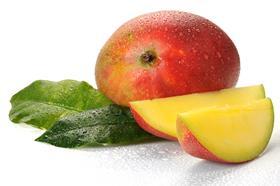
Mangoes are well established as a consumer favourite in the UK, but the category hasn’t been without its issues as it considers how to capitalise on recent growth.
Low retail pricing continues to be a major source of concern for suppliers, contributing to a two per cent fall in category spend to £51.7m in the last year [Kantar Worldpanel, 52 w/e 20 May 2018]. According to mysupermarket.co.uk, mango prices last week were significantly below average, with Sainsbury’s offering a large mango for 85p (40p off), Asda selling the same at 89p (11p off) and Waitrose taking its price down 35p to £1.
The value fall is being put down to increased promotional intensity, with major retailers also running a number of deals on mangoes for as little as 49p.
“Go into most retailers now and you will find mangoes on sale at various price points, pack formats and tiering together with varying levels of promotional activity and feature ends,“ says Wealmoor chief executive Avnish Malde. “These promotions are now stronger than ever before and have gained pace over the last year with more promotions, lower retails and stronger offers helping to grow volume and penetration at the expense of market deflation.”
Certainly the situation has helped drive purchases, with a 3.7 per cent volume increase over the past year, and there’s no suggestion consumers are losing their passion for the tropical fruit. Indeed, it features more prominently than ever in a variety of formats, predominantly pre-cut, as well as frozen and in fruit salads. The continuing craze for smoothies is boosting the category further, while premium-tier mangoes could help inject more value.
Mangoes are currently on sale from West Africa, the Caribbean, Brazil and India, with Wealmoor having also recently acquired Peruvian grower Sunshine, the South American country’s largest importer. “Our aim has always been to provide local farmers with a route to market for world-class product, and with Sunshine and Radville, in the Gambia, it will help us to be closer to the customer by providing them with what they want,” says Malde. “We are very confident and excited by what the future holds.”
Boosting mango production in Senegal
The Senegalese government has signed a memorandum of understanding with the IFC, the International Finance Corporation of the World Bank, to boost investment in the mango sector in order to increase competitiveness, La Tribune Afrique has reported.
The arrangement includes financing for all stages of the mango supply chain, with a particular focus on the Casamance region in the south of the country.
A major challenge will be to drive exports. In Senegal, a mere 15,000 tonnes of mangoes is either processed or exported, out of an estimated annual production of 120,000-150,000t.
The agreement was signed last month in Dakar and the project, funded by USAID, aims to generate CFA Fr10.5bn (£14m) in investments in the mango sector in order to raise incomes and create jobs.
The first step will be to support the implementation of business intelligence and knowledge management tools for the mango sector. APIX then aims to strengthen links between small mango producers and market operators by creating clusters to develop synergies.
The agency will also provide support to post-harvest and logistical service providers, with a particular focus on promoting private investment in the country’s mango sector.



